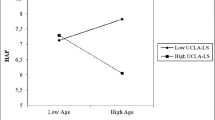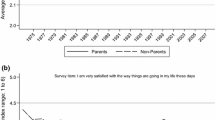Abstract
Macroeconomic downturns have been associated with a decrease in happiness among adults. The aim of this study was to explore the secular trend in happiness among Icelandic adolescents during a period of drastic change in the national economy as well as to identify which groups were most vulnerable and most resilient during the economic crisis. The data used in this study comes from series of population-based surveys of Icelandic adolescents in 2000, 2006, 2009, and 2010. Altogether, a total of 28.484 adolescents participated in the four surveys, representing 84 % of all 14–15 year old adolescents in Iceland. Results indicated that happiness increased by 5 % in the adolescent population from 2000 to 2010 despite the economic crisis. Nevertheless, adolescents who seldom spent time with their parents or perceived difficulties in getting emotional support from parents demonstrated a decrease in happiness. Those who found it easy to get emotional support from parents were happiest at every time point (91–93 %) while those who found it difficult were unhappiest (36–50 %). The association between socio- demographic factors and happiness was explored using multiple linear regression analyses where the year of survey, gender, age, family structure, parent’s education, time spent with parents and emotional support from parents altogether explained 13 % of the happiness variance. Emotional support from parents together with time spent with parents had the largest influence on adolescent’s happiness. An overall increase in time spent with parents was detected which might explain the increase in adolescents´ happiness over time. These results indicate that good relations with parents may protect adolescents from possible negative effect of a national economic crisis.

Similar content being viewed by others
References
Amato, P. R. (2000). The consequences of divorce for adults and children. Journal of Marriage and Family, 62(4), 1269–1287. doi:10.1111/j.1741-3737.2000.01269.x.
Argyle, M. (2001). The psychology of happiness. (2nd ed.). London: Routledge.
Asgeirsdottir, B. B., Ingolfsdottir, G., & Sigfusdottir, I. D. (2012). Body image trends among Icelandic adolescents: A cross-sectional national study from 1997 to 2010. Body image, 9(3), 404–408.
Bentham, J. (1789/1996). An introduction to the principles of morals and legislation. Oxford: Clarendon Press.
Boyes, R. (2009). Meltdown iceland: Lessons on the world financial crisis from a small bankrupt island. USA: Bloomsbury Publishing.
Burton, P., & Phipps, S. (2011). Families, time, and well-being in Canada. Canadian Public Policy, 37(3), 395–423. doi:10.3138/cpp.37.3.395.
Chen, W. C. (2012). How education enhances happiness: Comparison of mediating factors in four East Asian Countries. Social Indicators Research, 106(1), 117–131. doi:10.1007/s11205-011-9798-5.
Cohen, S., & Wills, T. A. (1985). Stress, social support, and the buffering hypothesis. Psychological Bulletin, 98(2), 310–357.
Conger, R. D., Ge, X., Elder, G. H., Lorenz, F. O., & Simons, R. L. (1994). Economic stress, coercive family process, and developmental problems of adolescents. Child Development, 65(2), 541–561.
Crabtree, S. (2010). Britons’ wellbeing stable through economic crisis: Life ratings, health measures prove resilient during recession. Retrieved February 2, 2011 from http://www.gallup.com/poll/144938/Britons-Wellbeing-Stable-Economic-Crisis.aspx.
Csikszentmihalyi, M., & Hunter, J. (2003). Happiness in everyday life: The uses of experience sampling. Journal of Happiness Studies, 4(2), 185–199. doi:10.1023/a:1024409732742.
Davis-Kean, P. E. (2005). The influence of parent education and family income on child achievement: The indirect role of parental expectations and the home environment. Journal of Family Psychology, 19(2), 294–304. doi:10.1037/0893-3200.19.2.294.
Diener, E. (2000). Subjective well-being—The science of happiness and a proposal for a national index. American Psychologist, 55(1), 34–43. doi:10.1037/0003-066x.55.1.34.
Diener, E. (Ed.) (2009). The Science of Well-Being. New York: Springer.
Diener, E., & Seligman, M. E. P. (2002). Very happy people. Psychological Science, 13(1), 81–84. doi:10.1111/1467-9280.00415.
Diener, E., & Seligman, M. E. (2004). Beyond money toward an economy of well-being. Psychological science in the public interest, 5(1), 1–31.
Diener, E., Suh, E. M., Lucas, R. E., & Smith, H. L. (1999). Subjective well-being: Three decades of progress. Psychological Bulletin, 125(2), 276.
Dolan, P., Peasgood, T., & White, M. (2008). Do we really know what makes us happy? A review of the economic literature on the factors associated with subjective well-being. Journal of Economic Psychology, 29(1), 94–122.
Easterlin, R. A. (2006). Building a better theory of well-being. In L. Bruni & P. L. Porta (Eds.), Economics and happiness: Framing the analysis (pp. 29–64). New York: Oxford University Press.
English, C. (2009). Crisis hurts financial institutions’ credibility in Europe: Confidence declines in 10 of 12 nations since economic downturn. Retrieved February 2, 2011 from http://www.gallup.com/poll/123482/Crisis-Hurts-Financial-Institutions-Credibility-Europe.aspx.
Esping-Andersen, G. (2002). Why we need a new welfare state. Oxford: Oxford University Press.
Fredrickson, B. L. (2004). The broaden-and-build theory of positive emotions. Philosophical Transactions: Biological Sciences, 359(1449), 1367–1377.
Greene, A. L. (1990). Patterns of affectivity in the transition to adolescence. Journal of Experimental Child Psychology, 50(3), 340–356. doi:10.1016/0022-0965(90)90074-I.
Gudmundsdottir, D. G. (2007). Subjective well-being in Iceland: The impact of demographic factors, social relationships, health and depression on subjective well-being in Iceland. Aarhus: Psykologisk Institut, Aarhus University.
Gudmundsdottir, D. G. (2013). The impact of economic crisis on happiness. Social Indicators Research, 110(3), 1083–1101. doi:10.1007/s11205-011-9973-8.
Hauksdóttir, A., McClure, C., Jonsson, S. H., Ólafsson, Ö., & Valdimarsdóttir, U. A. (2013). Increased Stress among women following an economic collapse—A prospective cohort study. American Journal of Epidemiology, 177(9), 979–988.
Helliwell, J. F., Layard, R., Sachs, J., & Council, E. C. (2013). World happiness report 2013: Sustainable Development Solutions Network.
Huebner, E. S., Suldo, S. M., Smith, L. C., & McKnight, C. G. (2004). Life satisfaction in children and youth: Empirical foundations and implications for school psychologists. Psychology in the Schools, 41(1), 81–93. doi:10.1002/Pits.10140.
Huppert, F. A. (2009). Psychological well-being: Evidence regarding its causes and consequences†. Applied Psychology: Health and Well-Being, 1(2), 137–164.
Huppert, F. A., Baylis, N., & Keverne, B. (Eds.) (2005). The science of well-being. Oxford: Oxford University Press.
Huppert, F. A., & So, T. T. C. (2013). Flourishing across Europe: Application of a new conceptual framework for defining well-being. Social Indicators Research, 110(3), 837–861. doi:10.1007/s11205-011-9966-7.
Iceland, S. (2007). Landshagir [statistical yearbook of Iceland]. Reykjavik: Statistic Iceland.
Iceland, S. (2008). Landshagir [statistical yearbook of Iceland]. Reykjavik: Statistic Iceland.
Iceland, S. (2009). Landshagir [statistical yearbook of Iceland]. Reykjavik: Statistic Iceland.
Iceland, S. (2010). Landshagir [statistical yearbook of Iceland]. Reykjavik: Statistic Iceland.
Ingolfsdottir, G., Asgeirsdottir, B. B., Gunnarsdottir, T., & Bjornsson, A. S. (2014). Changes in body image and dieting among 16–19-year-old Icelandic students from 2000 to 2010. Body image, 11(4), 364–369.
Kristjansson, A. L., & Sigfusdottir, I. D. (2009). The role of parental support, parental monitoring, and time spent with parents in adolescent academic achievement in Iceland: A structural model of gender differences. Scandinavian journal of educational research, 53(5), 481–496.
Lee, S., Guo, W.-J., Tsang, A., Mak, A. D., Wu, J., Ng, K. L., & Kwok, K. (2010). Evidence for the 2008 economic crisis exacerbating depression in Hong Kong. Journal of Affective Disorders, 126(1), 125–133.
Lyubomirsky, S., King, L., & Diener, E. (2005). The benefits of frequent positive affect: Does happiness lead to success? Psychological Bulletin, 131(6), 803–855. doi:10.1037/0033-2909.131.6.803.
Mahon, N. E., Yarcheski, A., & Yarcheski, T. J. (2005). Happiness as related to gender and health in early adolescents. Clin Nurs Res, 14(2), 175–190. doi:10.1177/1054773804271936. [Comparative Study].
McClure, C., Valdimarsdottir, U. A., Stuckler, D., Gudmundsdottir, D. G., & Hauksdottir, A. (submitted manuscript). Increase in female depressive symptoms following the 2008 financial crisis in Iceland: A prospective chort study.
Myers, D. G., & Diener, E. (1996). The pursuit of happiness. Scientific American, 274(5), 54–56.
Olafsson, S. (1999). Íslenska leiðin: Almannatryggingar og Velferð í Fjölþjóðlegum Samanburði. [The Icelandic Way: Public Insurance and Welfare in Cross-National Comparison]. Reykjavik, Iceland: Tryggingastofnun Ríkisins.
Park, N. S. (2005). Life satisfaction among Korean children and youth—A developmental perspective. School Psychology International, 26(2), 209–223. doi:10.1177/0143034305052914.
Petersen, E. (1989). Did the crisis hurt the Danes? Life conditions and quality of life in Denmark during the period 1976–1986, and how the Danes coped with the 1980–1982 crisis. In R. V. A. Hagenaars (Ed.), Did the crisis really hurt? Effects of the 1980–1982 economic recession on satisfaction, mental health and mortality (pp. 64–93). Rotterdam: Universitaire Pers.
Petersen, E., Kristensen, S. O., & Sabroe, K. E. (1987). Danskernes tilvaerelse under krisen (The Danes during the crisis), vol. I: Studier i krisens psykologiske virkninger (Studies in the psychological effects of the crisis). Aarhus: Aarhus Universiteitsforlag.
PMO. (2011). Iceland 2020—Governmental policy statement for the economy and community knowledge, sustainability, welfare. Reykjavik: Prime Minister´s Office.
Proctor, C., Linley, P. A., & Maltby, J. (2009). Youth life satisfaction: A review of the literature. Journal of Happiness Studies, 10(5), 583–630. doi:10.1007/s10902-008-9110-9.
Raibley, J. (2012). Happiness is not well-being. Journal of Happiness Studies, 13(6), 1105–1129. doi:10.1007/s10902-011-9309-z.
Reis, H. T. (1984). Social interaction and well-being. In S. Duck (Ed.), Personal relationships (Vol. 5, pp. 21–45). London: Academic Press.
Reis, H. T. (2001). Relationship experiences and emotional well-being. In C. D. Ryff & B. H. Singer (Eds.), Emotion, social relationships, and health (pp. 57–86). New York: Oxford University Press.
Seligman, M. E. P. (2011). Flourish. New York: Simon and Schuster.
Shi, Z., Taylor, A. W., Goldney, R., Winefield, H., Gill, T. K., Tuckerman, J., & Wittert, G. (2011). The use of a surveillance system to measure changes in mental health in Australian adults during the global financial crisis. International journal of public health, 56(4), 367–372.
Sigfúsdóttir, I. D., Thorlindsson, T., Kristjánsson, Á. L., Roe, K. M., & Allegrante, J. P. (2009). Substance use prevention for adolescents: The Icelandic Model. Health Promotion International, 24(1), 16–25. doi:10.1093/heapro/dan038.
Stein, C. H., Abraham, K. M., Bonar, E. E., Leith, J. E., Kraus, S. W., Hamill, A. C., & Fogo, W. R. (2011). Family ties in tough times: How young adults and their parents view the US economic crisis. Journal of Family Psychology, 25(3), 449.
Stiglitz, J. E., Sen, A., & Fitoussi, J.-P. (2009). Report by the commission on the measurement of economic performance and social progress.
Stuckler, D., Basu, S., Suhrcke, M., Coutts, A., & McKee, M. (2011). Effects of the 2008 recession on health: a first look at European data. The Lancet, 378(9786), 124–125.
Tabachnick, B. G., & Fidell, L. S. (2001). Using multivariate statistics (4th ed.). Boston: Allyn & Bacon.
Thjodfundur. (2009). Retrieved from http://www.thjodfundur2009.is/english/
Thorlindsson, T., & Bjarnason, T. (1998). Modeling Durkheim on the micro level: A study of youth suicidality. American Sociological Review, 63, 94–110.
Veenhoven, R., & Hagenaars, A. (1989). Did the crisis really hurt? Effects of the 1980–1982 economic recession on satisfaction, mental health and mortality. Rotterdam: Universitaire Pers.
Viinamäki, H., Hintikka, J., Kontula, O., Niskanen, L., & Koskela, K. (2000). Mental health at population level during an economic recession in Finland. Nordic Journal of Psychiatry, 54(3), 177–182.
Viinamäki, H., Kontula, O., Niskanen, L., & Koskela, K. (1995). The association between economic and social factors and mental health in Finland. Acta Psychiatrica Scandinavica, 92(3), 208–213.
Wahlbeck, K., & McDaid, D. (2012). Actions to alleviate the mental health impact of the economic crisis. World Psychiatry, 11(3), 139–145.
Wang, J., Smailes, E., Sareen, J., Fick, G. H., Schmitz, N., & Patten, S. B. (2010). The prevalence of mental disorders in the working population over the period of global economic crisis. Canadian journal of psychiatry. Revue canadienne de psychiatrie, 55(9), 598–605.
WHO. (2009). The financial crisis and global health: Report of a high-level consultation. Geneva: World Health Organization.
Acknowledgments
This work was supported by the grant from “The Icelandic Research Fund for Graduate Students”. We would like to thank Sigrún Helga Lund for statistical advice.
Author information
Authors and Affiliations
Corresponding author
Rights and permissions
About this article
Cite this article
Gudmundsdóttir, D.G., Ásgeirsdóttir, B.B., Huppert, F.A. et al. How Does the Economic Crisis Influence Adolescents’ Happiness? Population-Based Surveys in Iceland in 2000–2010. J Happiness Stud 17, 1219–1234 (2016). https://doi.org/10.1007/s10902-015-9639-3
Published:
Issue Date:
DOI: https://doi.org/10.1007/s10902-015-9639-3




